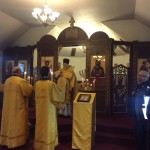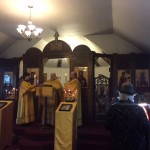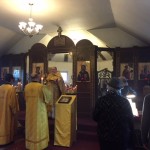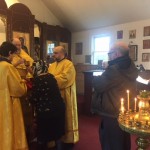On February 24, on the Sunday of the Prodigal Son, Rector of St. George Church, Archpriest Igor Tarasov served the Divine Liturgy at our parish temple. Following the Gospel lesson he preached the following homily in English:
“Today we celebrate another Sunday preparing us for Lent, Sunday of the Prodigal Son. The parable we heard in today’s Gospel lesson teaches us to repent and gives us a clear guidance for doing that. Let us think how we should follow that instruction.”
“First of all, dear brothers and sisters, we have to be honest with ourselves. A soccer referee was asked if he ever made mistakes in judging the players. He replied, “Of course, I make mistakes. My only problem is I cannot admit it”. We, as Christians, are called for humility to admit to ourselves and to God that we make mistakes. The Prodigal Son in today’s Gospel lesson was honest with himself with a frank and merciless honesty. It was when he admitted the wrong in himself and said, “I have sinned” (Lk. 15, 18). He came to his true self. He admitted his sinfulness and decided to go back to his father’s house.”
“For many of us it is very hard to say these 3 words: “I was wrong”. It takes an effort of humility and self-effacement such as few people are capable of. Yet, sometimes, no other words are more needed in our life than the words, “I was wrong”. They are magic words: words that reconcile, words that unite, words that heal wounds and bring peace. Imagine how different an outcome of many arguments between people could be if one of the parties would acknowledge its fault. Imagine how healing these words can be in family life. The first law of mental health is to be honest with yourself. If you have done wrong, don’t hide it. Don’t bury your guilt feelings in your mind where they will fester and later come out as a nervous or mental problem. Face the facts about yourself. Admit them. Confess them.”
“That is why the Church has the Holy Mystery of confession. That is why the Church urges us to use that amazing and wonderful opportunity to become clean and forgiven. Many people don’t like the idea of confessing to a priest and say that they can tell their sins to God directly. Well, first of all, this Sacrament had been established by our Lord. If we argue against it, we argue with Jesus Christ Himself. Secondly, it is very helpful to admit our faults to others and it is more than to admit them just to ourselves or to God in private prayer. It is not enough to say it to ourselves.”
“This is the second point we can make today: acknowledging our sins honestly but keeping them in ourselves is harmful. It can lead to despair. When Judas, for example, saw that Jesus was condemned, he brought the money to the chief priests and elders and said, “I have sinned by betraying innocent blood” (Mt. 24, 7). Then, throwing the pieces of silver in the temple, he went and hanged himself. Judas was remorseful enough to admit his sin to himself, even to the chief priests, but he could not bring himself to face Jesus and say, “I am sorry. Forgive me”. Thus, Judas began in a right way: he admitted his sin like the Prodigal Son; he said, “I have sinned”, but he did not go further. He made the first step but failed to make the second. He failed to act, to go to Jesus Himself and to confess before Him. Jesus, who forgave the penitent thief on the cross, would have forgiven Judas, too, if he had gone to the cross and confessed.”
“When the Prodigal Son said, “I have sinned,” he did not stop there. He took the next step. He said, “I will arise and go to my father” (Lk. 15, 18). And this is what God expects from us. When we see ourselves for what we really are, when we are ashamed of ourselves, when we have difficulty to accept ourselves, we can be sure of one thing – God will accept us in the same manner as the Prodigal Son was accepted in today’s Gospel.”
“Dear brothers and sisters! This is the way God welcomes us when, with deep repentance in our hearts, we come to Him with those magic words: “I was wrong”. Or, in a religious version the words are: “I have sinned”. Three of the most difficult words to say to yourself, to others and to God. But to the person who has enough courage to say them, there comes forgiveness, peace, new strength and new life!”
During the time of the preparation for the Holy Communion the choir prayerfully performed the hymns from the Lenten Triodion which begin to be sung on this Sunday, starting with the words “The door of repentance open to me, o Giver of life…”.
After the dismissal of the Liturgy the Rector preached a short sermon in Russian stressing the main ideas of his English homily. He also made some announcements.




